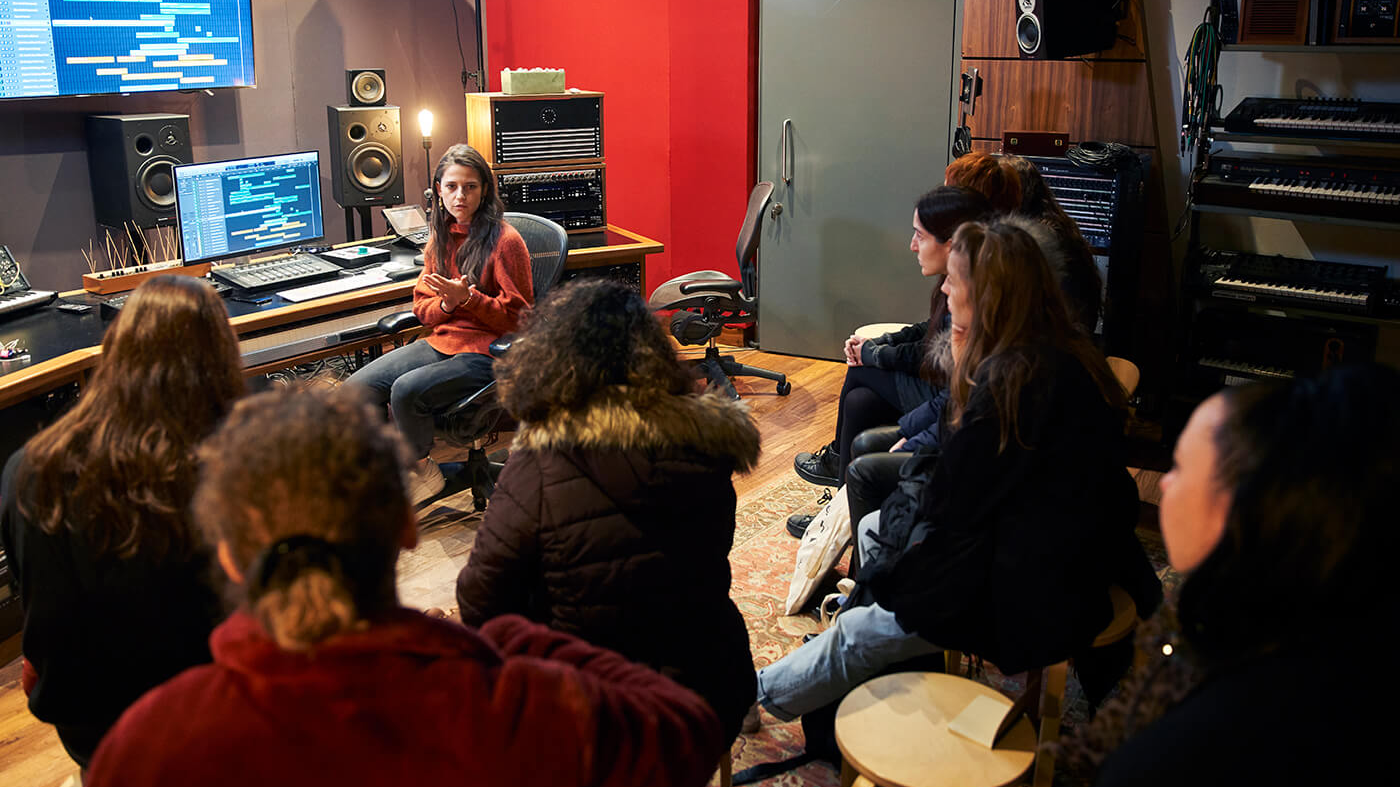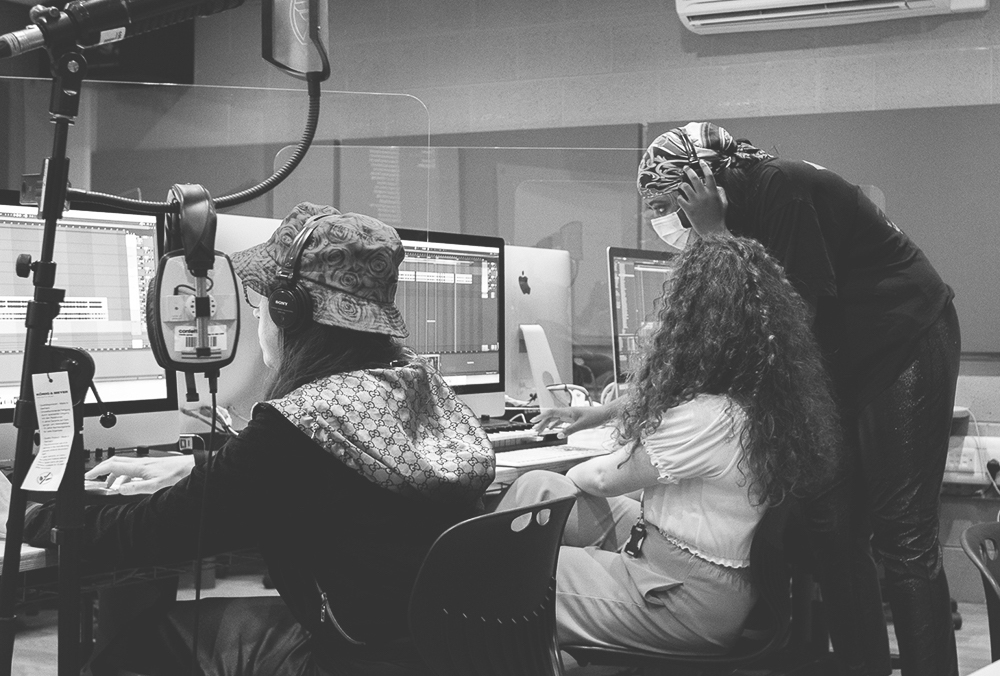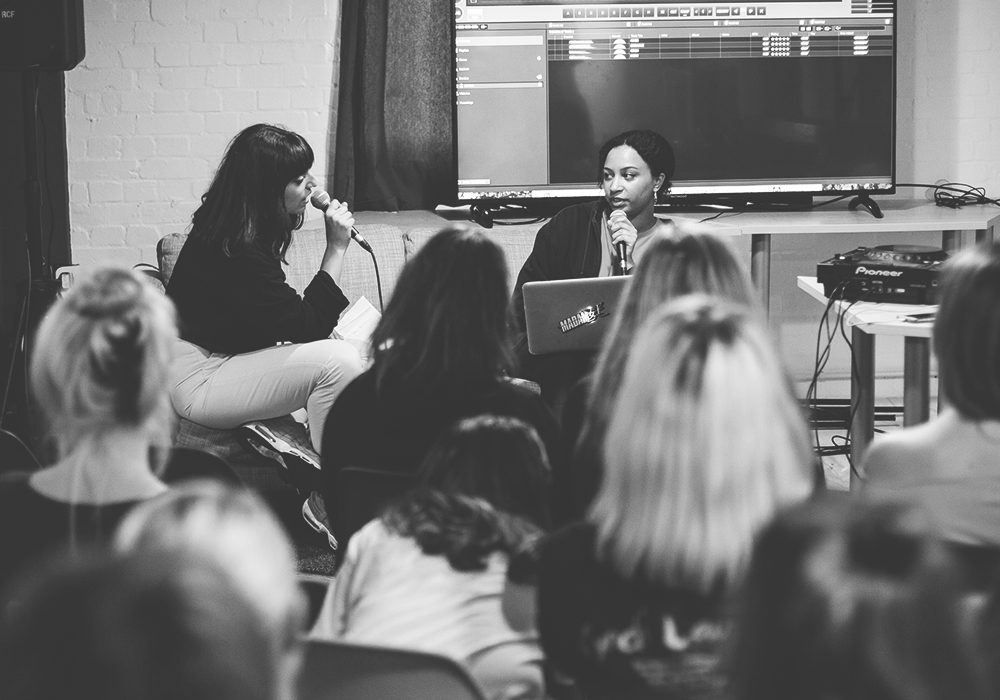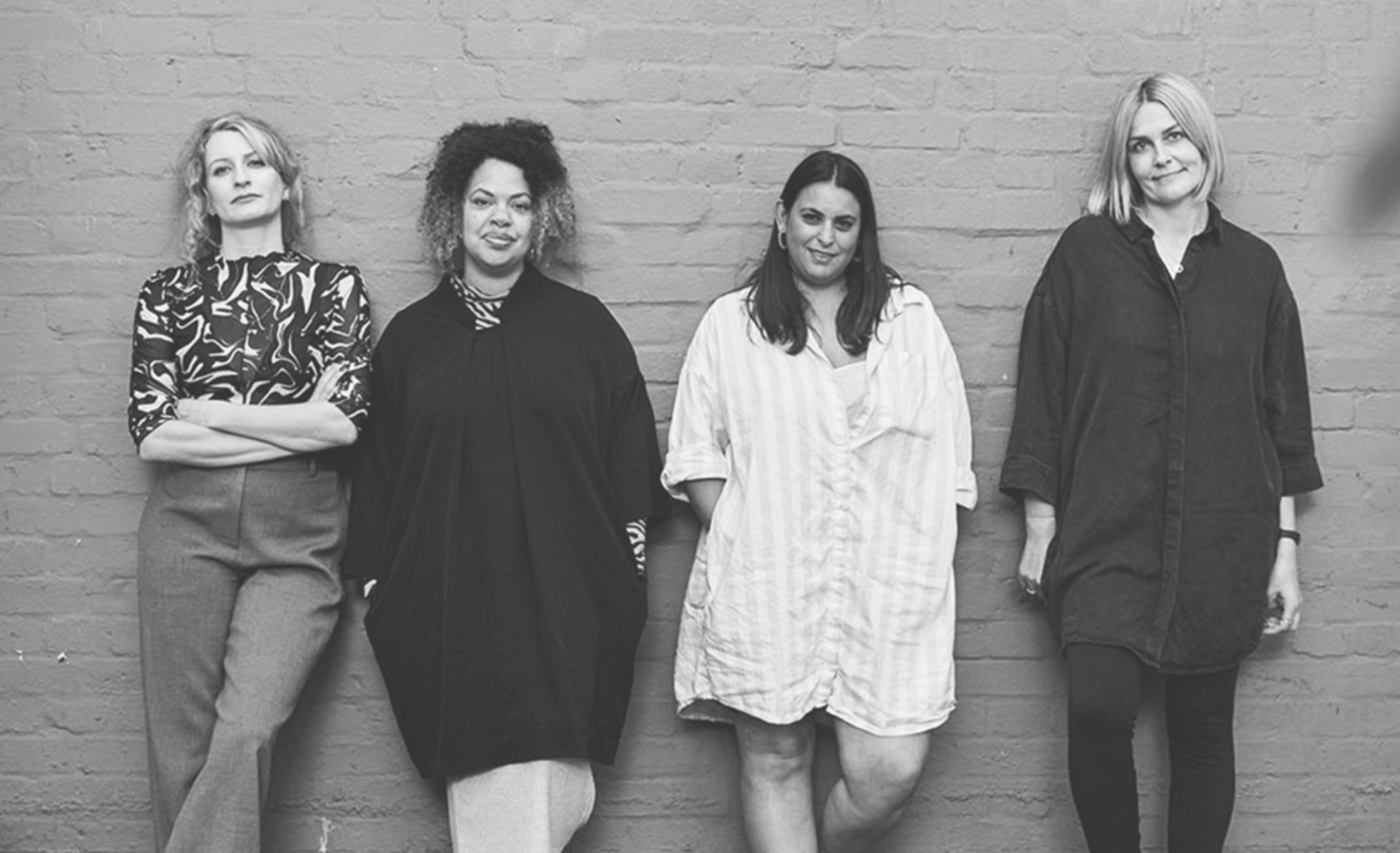Saffron is creating community and opportunity for female producers and women in music tech
On International Women's Day, we speak to the organisation facing the industry's gender imbalance head on

Want all the hottest music and gear news, reviews, deals, features and more, direct to your inbox? Sign up here.
You are now subscribed
Your newsletter sign-up was successful
Progress has been made in recent years in correcting the music industry's gender imbalance, with festival line-ups, label rosters and awards ceremonies gradually becoming less male-dominated and more inclusive of female and non-binary artists. And while there’s still ground to be gained, there’s no doubt that a change is underway.
It’s disheartening to notice how different the picture is, then, when we shift our focus away from the stage and towards the recording studio. Women are vastly underrepresented in the music tech industry, with studies indicating that women, non-binary and trans people occupy less than 5% of it.
A recent USC Annenberg report discovered figures that were even bleaker: after studying 900 popular songs from the past decade, they found that only 2.6% of the producers credited were female.
There doesn’t appear to be an upward trend, either. In 2020, the figure was 2%, lower than it was in 2012. And out of almost 1300 producing credits surveyed, just 9 of them went to women of colour. It follows that almost all of the music we hear on a daily basis - in our headphones, on the radio, on TV - will have been produced, mixed and mastered exclusively by men.
There’s no doubt that things need to change, and that the music tech industry has a serious problem with inequality. Saffron is a UK-based non-profit organisation working to change that.
Dedicated to addressing the gender imbalance within music tech, they’re seeking to create space, visibility and representation for women, female-identifying and non-binary people, while providing access to resources and a supportive community working towards this shared goal.
Saffron runs accessible music tech courses both online and in-person across the UK, helping those who are under-represented in the industry develop skills and build knowledge in music production, sound engineering and DJing.
Want all the hottest music and gear news, reviews, deals, features and more, direct to your inbox? Sign up here.
They also throw events, including 7 Days of Sound, an annual digital gathering that’s seen artists and producers such as Jlin, Anu and Rachel. K. Collier host virtual workshops and discussions. Saffron’s artist development platform also provides industry mentoring, live bookings support and educational resources to a number of female artists early in their career.
Most recently, they’ve announced the publication of a ‘zine that highlights Black women's work across the music tech industry, and the launch of a new initiative that will distribute forty music tech kits to emerging Black female musicians and producers across the UK.
Made up of Ableton Live 11 Lite, an Ableton Push 2 controller, a Teenage Engineering OP-Z synth and AIAIAI studio headphones, these free kits are intended to help beginners cultivate their skills while removing financial barriers to music production.
We spoke with three members of the team at Saffron, Lizzy Ellis, Phoebe Prior Watson and Glade Sinclair, to find out more about what they do, and hear about the challenges facing women in music technology, production and the recording arts.

Was there a particular experience or moment that led you to join the initiative?
Lizzy: “My entry point was through the Mix Nights DJ course. Most of us were already working in the music industry in other capacities, I was working in music management for about ten years, mostly in dance music. We were working with lots of male DJs, and wanted to do something to change that - giving better access and teaching specifically for women and minority genders was a way to do that.”
Could you tell us more about what Saffron does?
L: “There’s a few key components to our work. One of the main things is education. Another is representation, and the other is working with the industry. With education, it’s about the courses and workshops we run for women and non-binary people.
“That’s about making really accessible educational options for people to use as a springboard to go on to further study, or to help upskill them on the tech side. If they’re already an artist, we help them to get more tech-savvy, so they can take more creative control of their careers.
I don’t feel awkward in saying that donating to an organisation like ours can make a difference
“In representation, a lot of what we do is about trying to uplift diverse role models. It’s quite well proven now that if you have more diverse role models, and different kinds of people being lifted up, and in higher positions of power, it helps to bring more diverse people into that space as well.
“We’ve just launched the first edition of our Saffron ‘Zine, which has been produced with the goal to empower young Black girls and marginalised genders. The ‘Zine is going to be distributed for free within schools and colleges and we really want it to spotlight Black role models and act as a resource for inspiration, offering guidance and encouragement to young Black individuals dreaming of a career in music tech.”

“Improving access is also really important and, in all of our projects, we try to break down financial barriers where we can. Discounted or free tickets for our courses and events are always made available to those who need them and we offer bursary places for our Saffron Memberships too.
“Our latest project will provide forty Black women, non-binary and trans people in the UK with free music tech kits. We want to advance equality within our sector and make a career in music more attainable, starting with making essential equipment and learning resources more accessible.”
We want to advance equality within our sector and make a career in music more attainable
“The final thing is working with industry. We take the approach of working with people in the community and then also working with the existing industry, as there’s not much point in working with lots of people and getting them ready for industry, if the industry is not ready to accept them or make space for them. So we’re working with different figures and organisations in the industry to try and change some of those spaces.”
What are the biggest challenges facing women and non-binary people trying to break into the music and music tech industries?
Phoebe: “Lack of representation is a huge challenge. I think one of the really great things Saffron does is it provides a community for support. I’m not an artist or a DJ, but sometimes the music that I listen to feels quite male-dominated, and it can feel a little bit lonely at times. I think it’s important to provide women and non-binary people with a space where they can share passion and enthusiasm and learn from each other. I think that’s something that’s really necessary.”
L: “I think there needs to be a breaking of the cycle in areas like bookings and promotion. Most promoters are white men, and most people they book are similar. That cycle needs to be broken, and I do think it’s happening. Not always with the best intentions, but it is happening.”
If people really want to help, it just takes a little bit of effort and a little bit of work
Glade: “Education and resources. I think when learning about music in terms of production and sound engineering, it takes a little bit of money to have that kind of education and that equipment at a young age. So I think there’s a level of resources that aren’t distributed fairly enough.
“I think that is changing, and I’m optimistic about that. But there’s artists who not only can’t see any women in the sector, but can’t afford to be in the sector until somebody is allowing them into their space, which can take away the autonomy of your career. So you have to wait for somebody to let you in.”
How can our readers help to support the advancement of gender equality in the music tech industry?
G: “Buy women’s music. Buy music that isn't made by the same five people that you usually buy.”
P: “Go to events that have line-ups with women, non-binary and gender non-conforming people on them. The more people go to those line-ups, the more they’ll crop up.”
L: “That’s right. It’s often used as an excuse, the idea that these artists don’t sell tickets as much as men do. We need to prove that wrong, by putting our money in the pockets of places that are doing things right.

“I think if people really want to help, it just takes a little bit of effort and a little bit of work. Dig a bit deeper, find some more minority artists, and not just the ones that some of the bigger media outlets might be serving up. If people are serious about trying to represent them, they need to put some of that work in themselves.
“Also, showing financial support is important. I don’t feel awkward in saying that donating to an organisation like ours can make a difference. As Glade said, resources are a big, big thing. If organisations like ours have more resources to be able to continue doing our work, then we can do more sustainable work, rather than things that can be seen as more of a one-off.”
Tell us more about your artist development program - do you have any success stories you could share with us?
L: “Grove is someone we worked with in artist development. They live in Bristol now, but they’re originally from Gloucestershire. We did a release with them on our label, connected them with some mentoring, live shows and things like that.
“They’re doing amazingly well, and recently did a headline tour. It’s amazing to see that they're being very true to themselves and their sound and identity. And people are listening, which is great.”
How did Saffron respond to the challenges presented by the pandemic?
L: “It’s been tricky. All our in-person courses had to stop. They’re back up again now, and it’s been difficult to adjust. The big thing we did in 2020 was we launched our digital member’s club. That involves three different online workshops each month, looking at production, DJing and the music industry. That’s been amazing, because it’s allowed us to connect with people all over the world, and reach a wider audience, rather than just whoever can come to our in-person courses in the UK.”
7 Days of Sound featured everything from virtual sound baths to musical comic strip-drawing and cat sampling
G: “In January 2021, we launched an online festival, or conference, called 7 Days of Sound. We invited people all over the world to come and listen to women and non-binary people talk about music tech. There were, I think, nearly 300 people in the room, online. It was really beautiful to have that. I think it’s allowed us to connect with everybody a lot more.”
P: “7 Days of Sound returned for its second edition this January. Hosted by special guests including Jlin, Anu and Rachel K Collier, this year’s event was a special one, featuring everything from virtual sound baths to musical comic strip-drawing and cat sampling!”
“We might not have created an online festival and community if it weren’t for the restrictions, but as it turns out, online can offer something pretty amazing, pandemic or no pandemic. We had people from many different countries, from Argentina, from Kenya, the US, Germany, Pakistan and more, all connected in the same Zoom, learning together and listening and supporting each other. I think that’s one really positive thing that we can take from the pandemic.”
Visit Saffron's website to find out more about what they do.
You can support Saffron by donating or purchasing a copy of their 'zine on Bandcamp.



I'm MusicRadar's Tech Editor, working across everything from product news and gear-focused features to artist interviews and tech tutorials. I love electronic music and I'm perpetually fascinated by the tools we use to make it.